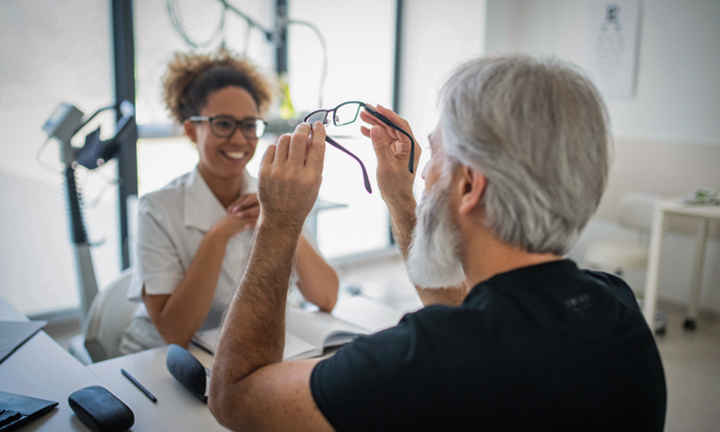Taking care of your vision health can make a huge difference in your quality of life. It feels wonderful to be able to see your loved ones clearly and to participate in all the activities that bring you joy. One of the first steps to better vision is learning about the different types of eye doctors, and then ensuring that you are receiving the proper eye care from an eye doctor near you. In this article you’ll find out the difference between an optometrist and ophthalmologist, and how simple it can be to find the right eye doctor so you can be on your way to long-term eye health.
Eye Doctors: What’s the Difference Between an Optometrist and Ophthalmologist?
There are two primary kinds of eye doctors: optometrists and ophthalmologists. Both can work together as a team for your eye care, but their focus and training are different.
An ophthalmologist can offer medical and surgical eye care. They have graduated from medical school and experienced both internship and residency before practicing ophthalmology. Ophthalmologists can offer complete eye services, such as:
- Vision services such as eye exams
- Medical eye care for glaucoma, iritis, and chemical burns
- Surgical eye care for trauma, crossed eyes, cataracts, glaucoma, and more
- Diagnosis and treatment of eye conditions related to other diseases such as diabetes
- Plastic surgery related to areas around the eyes
Optometrists are like primary care doctors for the eye. They have spent four years in a post-college professional program obtaining a Doctor of Optometry degree, but are not a medical doctor. Some optometrists get additional training or have specialty areas in which they work. They focus on regular vision care, and they can:
- Perform eye exams and vision tests
- Prescribe glasses and contact lenses, and ensure proper fit
- Monitor medical-related eye conditions related to diseases
- Manage and treat conditions like dry eye and glaucoma
- Provide low-vision aids and vision therapy
Together, optometrists and ophthalmologists offer the full spectrum of vision health services and care throughout your life. Your first choice for routine eye care is likely an optometrist so that you can assess any baseline conditions and make sure that any vision correction needs are covered.
There is another eye health professional you might have heard of, which is an optician. Opticians are not doctors and cannot give eye exams. Opticians may have obtained a one or two-year degree or certificate and they are qualified to fill the prescription an eye doctor gives you. Opticians may also provide or adjust the fit of your glasses or contacts, take facial measurements and help you choose frames or lenses that will work best.
Benefits of a Certified Eye Doctor
One of the most important things to know when choosing your eye doctor is that it is important to feel comfortable with them! Feeling at ease with your eye doctor who also has the correct qualifications, experience, and expertise, is a great first step at selecting the appropriate eye care provider.
No matter how you choose to take care of your vision health, it’s important to choose an eye doctor with the credentials and certifications that are required for licensing. When you choose a VSP® Individual Vision Plan, you’ll have quick access to vision care nationwide.
VSP network eye doctors are chosen carefully based on their professional licensing, work history, education, malpractice history, professional liability, and ethics. VSP in-network optometrists are Doctors of Optometry and are Therapeutic Pharmaceutical Agent (TPA) certified. The TPA designation indicates that the optometrist is certified to use therapeutic pharmaceutical agents and may treat certain conditions of the human eye, or any of its appendages, with therapeutic pharmaceutical agents. The optometrist may also perform certain procedures on the eye.
Ophthalmologists are American Board of Ophthalmology (ABO) certified. This certification is given by the American Board of Ophthalmology (ABO). This is a voluntary process and is the last step in a long and intensive educational experience designed to assure quality eye care. Certification is granted to ophthalmologists who successfully complete an accredited course of education in ophthalmology and an evaluation including an examination. The evaluation is designed to assess the knowledge, experience, and skills requisite to the delivery of high standards of patient care in ophthalmology.
Properly certified eye care professionals play an important role in ensuring that you receive the best patient care and helps give you confidence that your eye care provider is committed to providing the highest quality of care.
Finding an Eye Doctor Near You
You likely see your primary care doctor for routine checkups and to address any chronic issues you may experience. You might also separately visit your dentist for regular cleanings and tooth care. Like routine dental visits, general vision care is not covered by many health insurance plans. This is where vision insurance can be a huge help.
With the largest network of independent eye doctors in the country, VSP Individual VIsion Plans offer choice and convenience, no matter where you live. Looking for your eye doctor? Find a VSP provider in your area!
Choosing a VSP Individual Vision Plan That Works for You
Once you’ve chosen to take care of your long-term eye health, VSP makes it simple to get the coverage you need for your vision. With everything from prescription lenses to discounts on vision surgery to help you save on our vision costs.
It can makes a lot of sense to choose a vision plan to cover your routine eye care. Over the course of one year, getting an eye exam plus prescription frames and lenses can really add up. Even factoring in the cost of the vision plan premium, you can save hundreds of dollars!
With vision plan options that offer different levels of coverage, you can easily find coverage for yourself and your whole family. Finding a VSP plan is easy. The VSP Individual Vision Plan Selector guides you through each step, asking key questions to help you determine what coverage you are interested in so that you can explore all of your vision plan options.
Your vision. Your way.
Not covered for vision? Get an individual plan, customized for you – including where you want to use it: at the doctor, in a retail location, or even online.

Insurance Options and Job Loss
Job loss is a particularly stressful time as many people find themselves without their primary source of income, health insurance, and other health ...

What Is Covered by Vision Insurance?
Vision insurance can seem like a confusing aspect of healthcare, but understanding what vision insurance covers — and what it doesn’t co...

3 Reasons Retirees Need Vision Insurance
With an increasingly large number of employers providing vision insurance coverage as part of their group benefits packages, many people enter retir...
